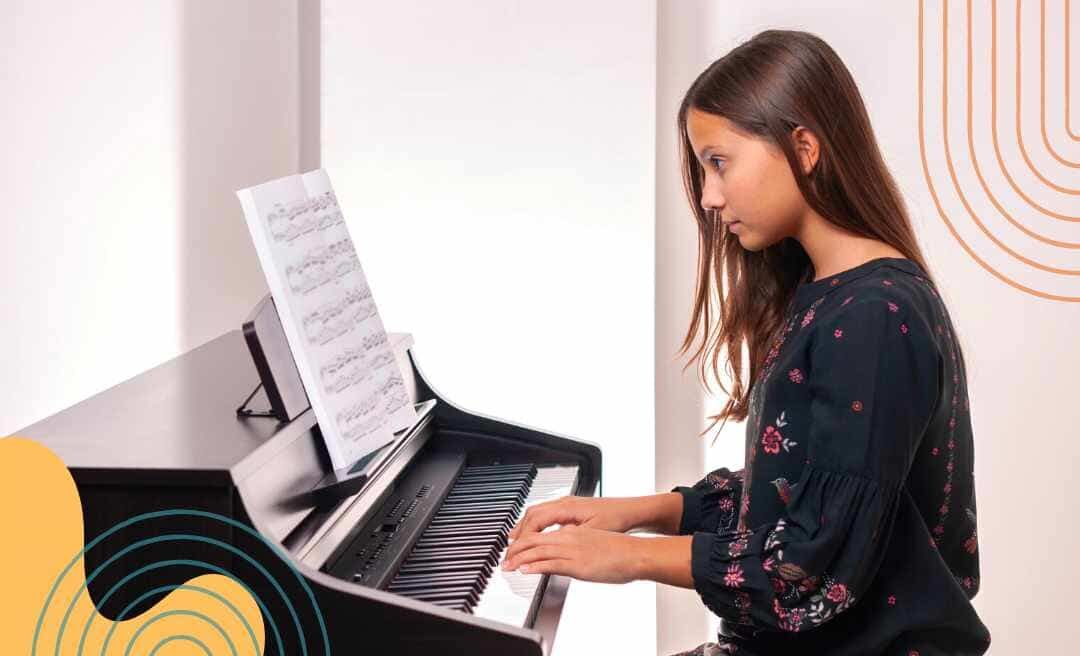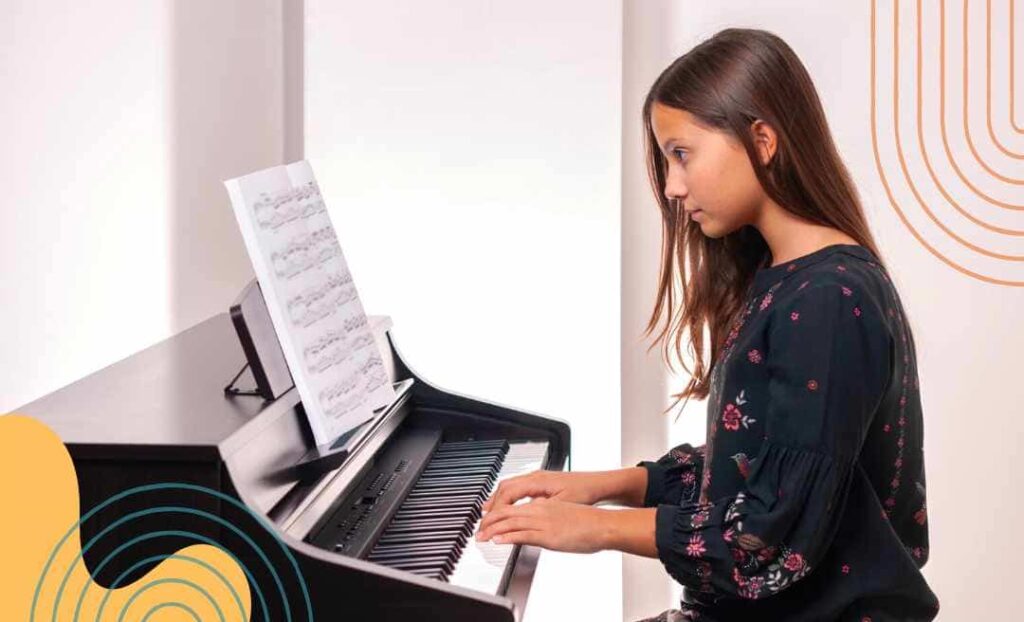How to Memorize Music
Easily and Reliably
Simple Technical Guide for Beginners to Advanced Music Students

Rose Park
3/4/21• updated 3/18/24 • 4 min read
Why memorize music?
Memorizing music seems like a challenge, but there are actually some good reasons to put in the work. For one, it helps you become a well-rounded musician. When you’ve got a piece memorized, you can perform it without focusing on the sheet music the whole time. This lets you enjoy all the little details and nuances in the music, rather than just staring at notes on a page.
It also gives you way more confidence and control over the performance itself. Rather than constantly thinking about what’s coming up next, you can really focus on expressing the music. It’s a challenge, but it can be a rewarding experience if you want to take your musicianship to another level.
60+
Instructors
25,000+
Lessons taught
4.9/5 ⭐⭐⭐⭐⭐
Average lesson rating
Every musician memorizes music differently
Some musicians learn better and memorize music visually through sheet music and videos. Some are simply better at memorizing by ear or through repetitive physical practice. In rare cases, you will even find musicians who memorize music notes by colors! Here are some factors that may influence why musicians memorize music differently:
- Musical background
- Practice habits and routines
- Difficulty of the music
- Level of concentration and attention to details
Which memorization technique works for me?
Which memorization technique is the best and works for you: visually or by ear? Both methods have their advantages and disadvantages, so it’s up to you to choose based on your preference and learning style.
When musicians memorize music through sheet music, they learn by reading thoroughly and interpreting the structure and details of the music. This memorization style helps learners developing a solid foundation in music theory and understanding the forms, patterns, and harmonies of the music. This is the most common way for musicians to memorize music, especially for classical piano students and string players like violinists.
Memorizing music by ear involves actively listening to the music, and this technique can be especially useful for developing a great sense of pitch and rhythm, which is important for musicians who improvise music, including jazz musicians and guitarists.
The best approach, ideally, is to use a combination of both memorization techniques. If you’re a beginner, make sure to explore different methods first and find what works well for you. If you’re an advanced musician, try to learn and memorize music using both methods more frequently and play them regularly to maintain your memory.
How to memorize music as a beginner
1. Break down the music into smaller sections
By practicing to memorize smaller sections, you can focus on the details and work on them in isolation.
First, break down the music into smaller parts by grouping the musical elements such as melody, harmony, rhythm, and dynamics. If you don’t know how to divide the music, you can start by isolating the primary melody and the accompaniment. After that, work on the primary melody until you feel comfortable and confident without having to look at the sheet music.
Now, practice the accompaniment repeatedly until you can play it from memory as well. Then, add the accompaniment to the primary melody, and play a few times without looking at the sheet music. Once you feel confident that you can play this section from memory, move on to the next phrase or melody and repeat the process until you complete the whole section.
The more you repeat this process, the more solid your memorization technique will become, and you will also be able to maintain the memory longer.

2. Practice and memorize music slowly
Slow practicing can help you memorize the correct dynamic markings, rhythms, pitches, and fingering. By practicing music slowly, you can pay attention to technique such as hand position, posture, and finger movements.
To start, break down the music into smaller sections and work on them independently. Set the metronome to a slow tempo, about 50% slower than the original tempo, and play the section repeatedly with and without the sheet music. For example, if the original speed is Moderato (80 BPM), start practicing at 40 BPM. Once you feel comfortable playing without looking at the score, gradually increase the tempo from 40 to 50 BPM, 50-60 BPM, and so on.
You can also use a recording device to record yourself and listen back to the recording. This exercise will help you find the areas where you’re feeling hesitant to play or unsure about the memory. At the end of the practice session, make sure to play through the entire music from memory.
For beginners, the key is to reduce memory errors over time and improve the memorization technique. Don’t worry if you make memory mistakes even after practicing slowly. What matters is to keep practicing and strengthening your memory over time.
3. Practice hands separately
If you play piano or other instruments that require both hands, it’s important to make practicing hands separately a routine part of your practice. This technique can help musicians develop muscle memory for each hand, leading to smoother and more accurate playing. Muscle memory allows your fingers, wrists, hands, legs, and body to play the music without distraction, making it a reliable memorization technique for many learners.
Practicing hands separately can also help you identify issues with one hand or the other. Take the time to analyze why one hand might be having more difficulty and work on those sections in smaller parts with repetition to build up your skills.
4. Play from memory in front of others
For both beginners and advanced players alike, playing music from memory in front of people is a valuable experience. Invite your family and friends and play music as if it were a small live performance. This will boost your confidence as a musician and demonstrate your musical skills and hard work.
Don’t worry if you make a few memory mistakes during the performance. What matters for beginners is finding ways to overcome memory challenges and continuing to make beautiful music.
How to memorize music as an intermediate or advanced musician
1. Memorize music by visualizing
The visualization technique is a neat skill that helps musicians remember musical elements visually. By practicing this technique, students can better recall musical elements, including dynamic notations, music notes, and patterns. Here are a few simple steps you can try:
- Listen to the recording: Start by listening to the music multiple times and pay extra attention to the melody, harmony, dynamics and rhythm.
- Create associations: When you practice certain parts, try to associate them with particular emotions or image. For instance, you can recall happy or sad memories and link them to specific parts of the music.
- Build a visualization routine: Create a routine for visualizing the mental picture of the music even outside of your practice sessions. This will help you boost your memorization skills and build your confidence as a growing musician.
2. Learn new music and memorize often
As an advanced music learner, it’s important to keep pushing your musical boundaries by exploring new music and practicing how to memorize it regularly. By doing this, you’ll not only improve your memorization skills but also expand your musical repertoire and knowledge.
Start by tracking how long it typically takes you to learn a new piece of music. If it usually takes two to three weeks, consider beginning the memorization process during the second week. Experiment with various memorization techniques during this stage to discover which technique works best for the new piece.
Learning new music and committing it to memory may be challenging sometimes. But with patience and dedication, you’ll see progress and growth in your musical skills, making all the hard work worth it in the end!

3. Review memory mistakes
After playing a piece of music from memory, it’s important for musicians to take some time to review any mistakes they made. This can be a great opportunity to identify any areas in the music that are causing trouble and further develop your problem-solving skills. Here are some helpful questions you can ask yourself while reviewing your performance:
- Did you find specific passages (from memory) hard to play? What went wrong during the performance or practice?
- What caused the memory error? Was it a technical mistake or something else?
- Was the memory mistake consistent or random? When it happened, how did you overcome the challenge?
- Is there something you can do differently next time to avoid the memory error?
- What memorization technique will you use to improve overall memory of the music?
Learn memorization techniques with professionals
Lesson With You offers 1-on-1 live online lessons with professional music instructors who earned at least Bachelor’s degrees from the top music schools including Eastman school of Music, Indiana University and Guildhall Music School.
The first trial lesson is free! No Contract Ever.
Music Guides: Beginner to Advanced
Interested in a certain style?
Musical Theatre Singing Lessons | Classical singing Lessons | Rock singing Lessons | Country singing Lessons | Pop Singing Lessons
Classical Guitar Lessons | Acoustic Guitar Lessons | Jazz Guitar Lessons | Rock Guitar Lessons | Electric Guitar Lessons | R&B Guitar Lessons

Rose Park
Rose Park is a graduate of the Jacobs School of Music at Indiana University where she studied Piano Performance and Arts Administration, receiving both Bachelor's and Master's degrees before co-founding Lesson With You. As a pianist, Rose was a prizewinner in many international piano competitions and performed at various summer programs and festivals across the United States, Italy, and Japan.




